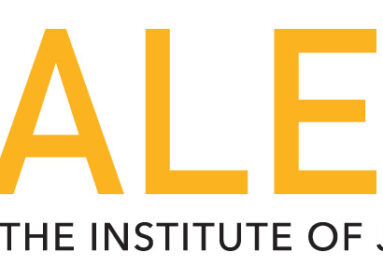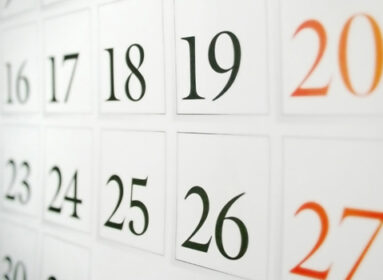
By Michala Katz
There’s a difference between hearing someone’s story and having a brief desire to make an impact, and waking up the next day and putting in the effort to make that impact. This was only one of the realizations I gained this past July when I chose to spend 10 days before my senior year of high school in Washington, D.C., as part of a BBYO community service program focused on homelessness.
D.C. Central Kitchen was the first service site at which we volunteered. The strong smell of urine and the sight of people sleeping on the sidewalks hit our group of 18 as we walked into the back entrance of the industrial-sized kitchen. But then we resumed laughing and chatting, as we turned our heads away from a reality many of us were used to ignoring.
The woman at the desk led us into a room next to the kitchen, gave us hairnets, and disposable gloves and aprons, then played for us a video that illustrated kitchen safety and sanitation, and summarized D.C. Central Kitchen’s mission. All of the 5,000 meals made in the kitchen each day are distributed to different food kitchens and nonprofit organizations. D.C. Central Kitchen also conducts a program which gives ex-convicts an opportunity to obtain a food sanitation license after completing the necessary classes. Ninety percent of these convicts get jobs; only seven percent end up back in prison.
Once we were in the kitchen, five boys were taught how to butcher turkeys; and the girls were taught how to make scrambled eggs for fried rice and cut up zucchinis.
Later that day, I went with half the group to Martha’s Table. For the past 25 years, volunteers from Martha’s Table have driven a van at dinner time to a highly populated area in D.C. where people experiencing homelessness line up to get a hot meal. As we unloaded two folding tables, along with the trays of food, there was already a line of “customers” forming at the back of the truck. I scooped the hearty stew from the metal pan and served it to person after person in paper to-go containers. Some people asked for another good scoop, which I smiled and gave them. Some smiled warmly and said, “Bless you for doing this, have a good night.” I smiled in return and told them to enjoy their night – then I thought, “Enjoy their night? They’re probably going back to that stoop or bench to stay for the night. What do they really have to enjoy?” Some people took the food from my hands without saying a word, then went back to the end of the line, still eating their first serving. Time seemed to pause and speed up simultaneously as I shared smiles with people so different than me, giving them their next meal. The end of the line out of sight.
That afternoon, we visited Arlington National Cemetery. I had promised my mom that I would visit the graves of her grandparents who are buried there, though I had never met either of them. I was named Michala after my great-grandmother, Mary. A few people joined me as we navigated through the heavy heat to their headstones. They recited the Mourner’s Kaddish with me and we placed a stone on both of their graves. At that moment, I knew I had made some people really happy. I also knew it was more than that; Judaism has always been a part of me. When I joined BBYO and later signed up for this trip, suddenly Judaism became an unexplainable motivation deep inside me.
The next night, we went to Central Union Mission, a food kitchen and homeless shelter. We each went through a cafeteria line, took a tray and loaded it with a plate of sloppy Joes, a glass of water, a dessert, and silverware. As men shuffled into the dining hall, we each set the food in front of someone, told that person to enjoy his or her meal, and went back through the line. Later that night, I struggled with accepting what I had done at Central Union Mission. Anyone could put food on a tray and give it to someone, I thought. What was I doing to help? I couldn’t even say that I cooked that meal. Days later I realized that, yes, anyone could cook or serve a meal. But while the extent of an action is important, the choice to put any effort in is just as important. Despite the simplicity of serving a meal, many people don’t choose to do that.
On our third full day in D.C., we visited the National Coalition for the Homeless, where we met Steve and Candi who used to be homeless, though they were never “homeless people.” All of us are probably guilty of using this term without hesitation. The first night of the program, we were introduced to new terminology: people experiencing homelessness. It wasn’t until I met Steve and Candi that I fully understood the difference between the two phrases. The term “homeless person” comes with all sorts of stereotypes: i.e., a person who is dirty, uneducated, drug addicted, etc. Homeless shouldn’t be an adjective to describe someone nor is it a lifestyle; it is just a temporary condition.
Steve and Candi told us their stories. Steve grew up not knowing his father and living with an abusive mother. She hit him and told him it would be better if he were dead. Steve experimented with drugs and experienced homelessness for many years, until one day about eight years ago. “All I wanted was someone to say good morning to me,” he told us. Then, he said, “One night, a small five-foot- two white man came up to me near a park bench. I thought he was going to kick me. But the next day, he took me to a drug rehab center. He is my angel. He saved me.”
Candi grew up in a loving family and dreamed of becoming a nurse to make an impact in the world. But the job wasn’t what she had imagined it would be. Soon, she became depressed and sick, and quit her job. For seven years, she dealt with grueling pain and depression before doctors were able to diagnose her. She spent years living with other people dealing with poverty and was finally diagnosed with fibromyalgia. Eventually, Candi found low-income housing and her mental and physical health improved.
Steve and Candi are some of the most intelligent and indubitably bravest people I have ever met. One of the most profound things they taught me was that everyone’s story is different no matter your background.
On the first night of the trip, each of us shared our goals for the following 10 days. We made a web of change, wrapping yarn around each of our wrists and passing the skein around to connect our personal goals. “I want to try to get something out of every experience,” I said. We then cut the yarn to make bracelets and were to give the bracelet to someone we met who inspired us.
Before we toured the United States Holocaust Museum, we met Josie, a child survivor of the Holocaust whose family was separated during the war. She was sent to live in hiding with strangers; her mother was sent to concentration camp. Her mother survived and Josie’s family was reunited after the war. Someone asked where Josie’s mom was now. We held our breaths awaiting a tragic answer. “Oh, she’s right upstairs at the desk on the fourth floor.” Only minutes later, two museum security officers wheeled in Josie’s mother. After meeting two gorgeous, courageous women, I decided to give Josie my bracelet. “Meeting you and hearing your story has made me feel even prouder to be Jewish,” I told her as I tied the faded green yarn around her wrist. I felt that this summer program allowed me connect to Judaism in ways I didn’t know possible.
There were many other experiences during our 10-day trip – too numerous to mention. We toured the U.S. Capitol, the Library of Congress, the National Portrait Gallery, the Lincoln Memorial, the World War II Memorial, and more. We volunteered at Capital Area Food Bank and built a swing set for an impoverished family.
All in all, the BBYO summer program was an eye-opening, life-changing experience that allowed me to step out of my comfort zone. I truly have a new found respect for people from different backgrounds and walks of life. I learned that something insignificant to you could have a potentially huge impact on someone else.
Michala Katz lives in Hamden. This fall, she begins her senior year at Hamden Hall Country Day School.
Readers are invited to submit original work on a topic of their choosing to Kolot. Submissions should be sent to judiej@jewishledger.com.
CAP: BBYO teens in Washington, D.C. this summer.








 Southern New England Jewish Ledger
Southern New England Jewish Ledger














